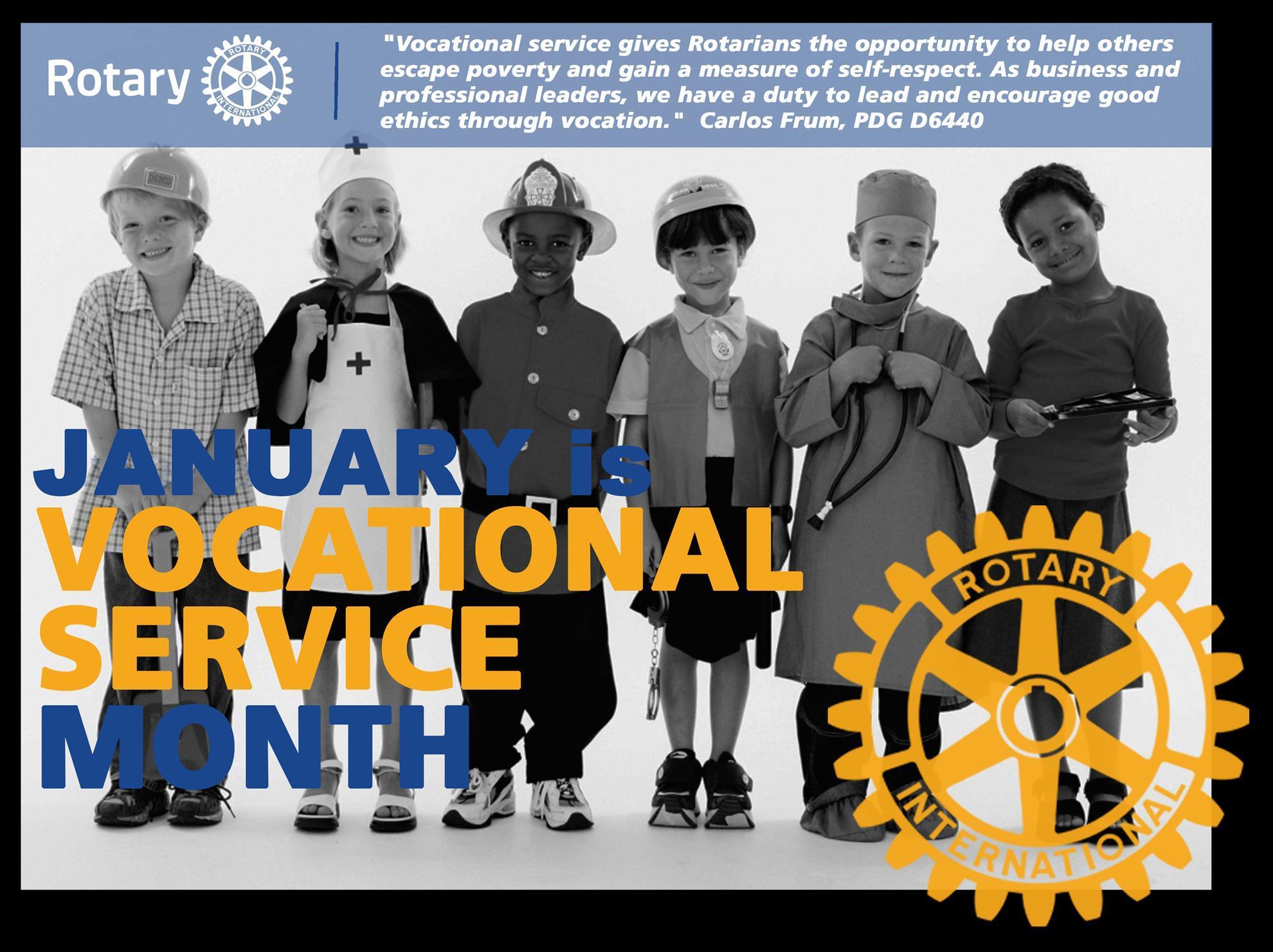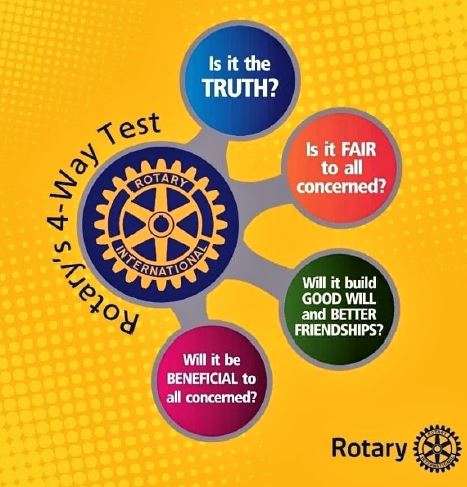
A Short History Lesson
Originally only one representative from each business or profession was invited to join a club. Paul Harris felt that if several members of the same profession were to join, they would either sit together and “talk shop” or compete against each other for other members’ business. The idea of “trade-boosting” was gradually eliminated and by 1912, Rotarians were no longer required to exchange business with one another.
The Forgotten Avenue of Service
Of Rotary’s five Avenues of Service* – Club, Vocational, Community, and International – Vocational is difficult to define, so it is sometimes called the “Forgotten Avenue of Service”. One reason is Club, Community, International and Youth Service activities usually involve groups of Rotarians. They enjoy the fellowship of Club Service, the satisfaction of serving the needs of their communities, and the hope that their International Service promotes world peace and understanding. But Vocational Service – the second Avenue of Service -- is generally conducted by individual members.
Service Above Self
Rotary’s early leaders often cited the Golden Rule – “Do unto others as you would have them do unto you” – as the guiding principle of Rotary’s Vocational Service. By the time the National Association of Rotary Clubs held its first convention in 1910, the networking emphasis had begun to shift. The majority of clubs told the new Civic Committee that Rotary should move from being a booster club to improving their communities. The concept of “he profits most who serves his fellows best” became “he profits most who serves best”. This idea morphed into “Service, not Self” and finally, it became the Rotary slogan we know today -- “Service Above Self”.
In 1940, Rotary International defined the Object of Vocational Service “to encourage and foster: high ethical standards in business and professions; the recognition of the worthiness of all useful occupations; the dignifying by each Rotarian of his occupation as an opportunity to serve society.” Today’s Rotarians still pride themselves on being able to use their professional stature and knowledge to make things happen worldwide, wherever there is a need for change.
The Rotary Code of Ethics
Back in 1912, when Glenn Mead succeeded Paul Harris as President of Rotary International, he recommended a code of business ethics be formulated to contribute to the advancement of business morality. At that time, there were no consumer protection laws or truth-in-advertising statutes. Fraudulent and deceptive business practices were the norm. The unwritten law was caveat emptor, “Let the buyer beware.” Since the adoption of the Rotary Code of Ethics in 1915, at least 145 national industrial codes of conduct practice have been adopted as a direct result of the influence of Rotarians.
The Four-Way Test
From the earliest days of the organization, Rotarians were concerned with promoting high ethical standards in their professional lives. One of the world's most widely printed and quoted statements of business ethics is The 4-Way Test, which was created in 1932 by Rotarian Herbert J. Taylor (who later served as RI president) when he was asked to take charge of a company that was facing bankruptcy. This 24-word test for employees to follow in their business and professional lives became the guide for sales, production, advertising, and all relations with dealers and customers, and the survival of the company is credited to this simple philosophy. The 4-Way Test has been translated into more than a hundred languages and published in thousands of ways.
Rotary’s current code of ethical conduct – The Four-Way Test – is a four-part ethical guideline that helped Herb Taylor rescue a beleaguered business.
The code’s four points are simple and direct .
“Of all the things we think, say or do:
1. Is it the TRUTH?
2. Is it FAIR to all concerned?
3. Will it build GOODWILL and BETTER FRIENDSHIPS?
4. Will it be BENEFICIAL to all concerned?”
The Four-Way Test was officially adopted by Rotary in 1943 and has been translated into the languages of over 100 countries. It appears on highway billboards, in schoolrooms and on the walls of businesses, in labour contracts, courtrooms and halls of government. It’s even on the moon, in the form of a Four-Way Test pin planted on the surface by astronaut Buzz Aldrin!
The Heart of Rotary
Vocational Service remains at the heart of Rotary. In 1987-88, RI President Charles C. Keller reinvigorated the Avenue by appointing the first Vocational Service Committee in 50 years. The committee redefined how clubs could more effectively participate in Vocational Service and drafted the new Declaration of Rotarians in Businesses and Professions.
DECLARATION FOR ROTARIANS IN BUSINESS AND PROFESSIONS 
As a Rotarian engaged in a business or profession I am expected to:
- Consider my vocation to be another opportunity to serve
- Be faithful to the letter and the spirit of the ethical codes of my vocation, to the laws of my country, and to the standards of my community
- Do all in my power to dignify my vocation and to promote the highest ethical standards in my chosen vocation
- Be fair to my employer, employees, associates, competitors, customers, the public, and all those with whom I have a business or professional relationship
- Recognize the honour and respect due to all occupations which are useful to society
- Offer my vocational talents; to provide opportunities to young people, to work for the relief of the special needs of others, and to improve the quality of life in my community
- Adhere to honesty in my advertising and in all representations to the public concerning my business and profession
- Neither seek from or grant to a fellow Rotarian a privilege or advantage not normally accorded to others in a business or professional relationship
Today, with over 1.2 million members in more than 35,000 clubs in nearly 200 countries, Rotary provides humanitarian service, promotes high ethical standards in all vocations, and helps build international understanding, goodwill and peace.
The author would like to thank David C. Forward: A Century of Service (2003) as part of the material for this article.
Do You Know the Rotary Code of Conduct?
ROTARIAN CODE OF CONDUCT
As a Rotarian, I will:
1. Act with integrity and high ethical standards in my personal and professional life
2. Deal fairly with others and treat them and their occupations with respect
3. Use my professional skills through Rotary to mentor young people, help those with special needs, and improve people’s quality of life in my community and in the world
4. Avoid behavior that reflects adversely on Rotary or other Rotarians
VOCATIONAL SERVICE PROJECTS - IDEAS FOR YOUR CLUB:
During Vocational Service Month, Rotary clubs highlight the importance of the business and professional life of each Rotarian.
Distribute the Four Way Test to local schools, businesses, members of parliament.
Discuss Vocational Service and Business excellence Awards with your local businesses. Present awards.
Assist with skills development or training.
Use your skills to help others.

